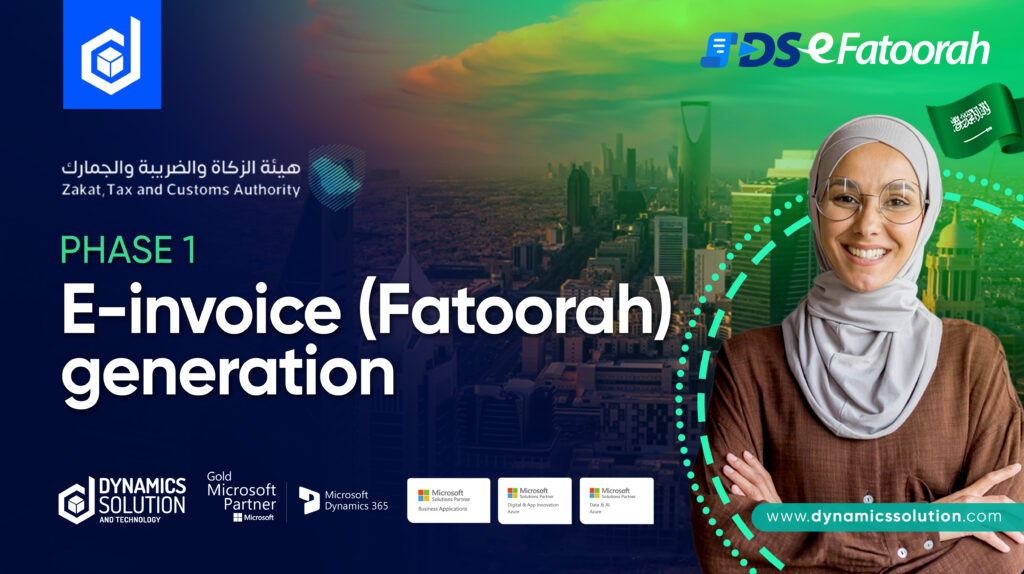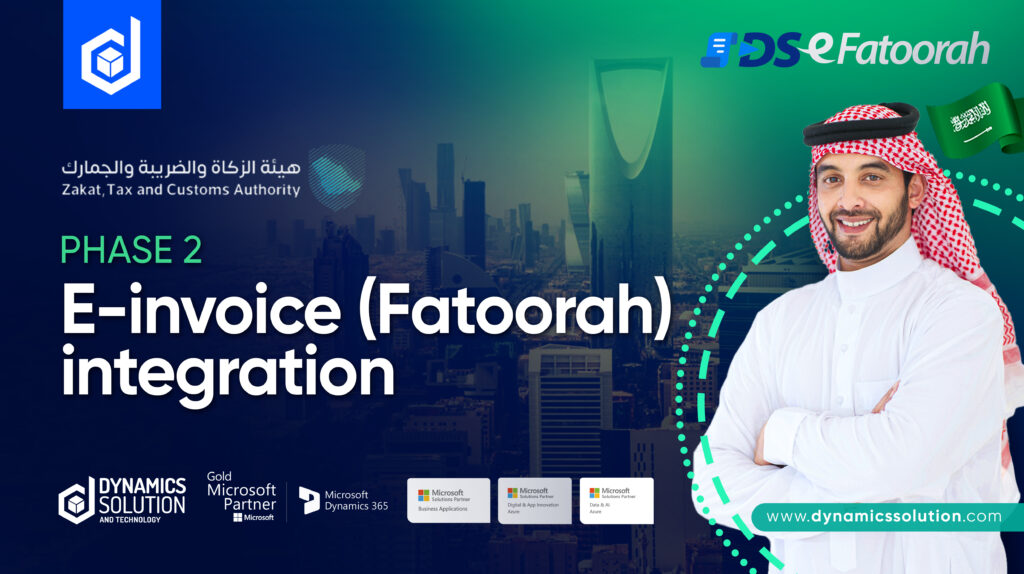From the start of December 2021, Zakat, Tax and Customs Authority (ZATCA), formerly known as GAZT, has fully implemented Phase 1 of e-invoicing throughout the Kingdom of Saudi Arabia (KSA). This blog breaks down Saudi Arabia’s e-invoicing process into two stages.
ZATCA E invoicing Waves Timeline
June 16th, 2023
ZATCA, under phase 2 of e-invoicing, has released its sixth wave, which highlighted that VAT-registered enterprises with more than SAR 70 million in either 2021 or 2022 would be required to implement e-invoicing. The deadline to integrate the ERP/POS systems into ZATCA’s Fatoorah portal is January 1, 2024.
May 26th, 2023
ZATCA, under phase 2 of e invoicing, has released its fifth wave, which highlighted that VAT-registered enterprises with annual sales of more than SAR 100 million in either 2021 or 2022 would be required to implement e-invoicing. The deadline to integrate the ERP/POS systems into ZATCA’s Fatoorah portal is December 1, 2023.
April 28th, 2023
ZATCA, under phase 2 of einvoicing, has released its fourth wave, which highlighted that VAT-registered businesses with annual sales of more than SAR 150 million and less than SAR 250 million in either 2021 or 2022 would be required to implement e-invoicing. The deadline to integrate the ERP/POS systems into ZATCA’s Fatoorah portal is November 1, 2023.
March 24th, 2023
ZATCA, under phase 2 of einvoicing, has released its third wave, which highlighted that VAT-registered businesses with annual sales of more than SAR 250 million and less than SAR 500 million in either 2021 or 2022 would be required to implement e-invoicing. The deadline to integrate the ERP/POS systems into ZATCA e invoicing solution Fatoorah portal is October 1, 2023.
December 23rd, 2022
ZATCA, under phase 2 of e invoicing, has released its second wave, which highlighted that VAT-registered businesses with annual sales of more than SAR 500 million and less than SAR 3 billion would be required to implement e-invoicing. The deadline to integrate the ERP/POS systems into ZATCA’s Fatoorah portal is July 1st, 2023.
Check out the ZATCA website here.
Phase 1: E-invoice (Fatoorah) generation.

Fatoorah, also known as e-invoicing in the KSA, begins with the generation step. Starting on the 4th of December 2021 and lasting until the 31st of December 2022, Phase 1 was put into effect. Applicable people bound to the e-Invoicing Regulations must create electronic invoices and corresponding Credit and Debit Notes (CDNs) in a way that adheres to a defined set of rules and technological standards.
The comprehensive guidelines define the generation rules, technical specifications, and procedural rules for e-invoice solutions that are called the Resolution on the Controls, Requirements, Technical Specifications, and Procedural Standards. In the future, the authority will consistently modify the resolutions to ensure they are in line with the standards.
The following is a list of the requirements that have been established for the generation of e-invoices and simplified e-invoices from the 4th of December 2021 until the 31st of December 2022:
- To generate electronic invoices, each and every invoice needs to be created and sent by electronic means.
- In Phase 1 of a B2B or B2G transaction, the supplier is required to prepare an e-invoice, send it to the buyer, and keep the invoices.
- In Phase 1, the seller must electronically create simplified e-invoices, send them to the customer, and keep the Fatoorah for all B2C transactions. Customers can check the information by scanning the QR code that is displayed on the invoice.
- There is no specific format that is mandated to be used by companies. The use of a cryptographic stamp is also optional.
- Businesses are required to create e-invoices, including the fields that are relevant to non-integration.
- E invoices are required to be maintained in a manner that complies with VAT regulations so that relevant authorities can access them whenever needed.
- It is not necessary to include a QR code in e-invoices; however, a simplified electronic invoice must include a QR code that defines the essential invoice information and taxpayer data.
- E-invoice Generating Solution (EGS), including the device registration, the Universally Unique Identifier (UUID), and the Hash, are optional.
- The software that generates electronic invoices has to have the capacity to establish a connection to the Internet.
- During Phase 1, the clearance and reporting of Fatoorah is not necessary nor required to be mandatory.
Phase 2: E-invoice (Fatoorah) integration.

The second phase of e-invoicing is the integration phase in which companies must comply with the second phase as of January 1, 2023. The integration phase has been carried out in phases and will become obligatory for individuals who have been notified under the e-invoicing Regulations.
As part of this phase, the appropriate people identified in the e-Invoicing Regulations will be required to integrate their e-invoice systems with the ZATCA system. In Saudi Arabia, they refer to those who fall within this category as target groups.
Prior notification of the integration processes will be given to the target groups at least six months before the implementation date for integration in Saudi Arabia. Businesses in KSA with a 2021 revenue of more than 3 billion SAR are required to switch to e-invoicing in January 2023.
The Resolution lays forth the guidelines for implementing the Controls, Requirements, Technical Specifications, and Procedural Rules. In the future, the authority could amend the situation by passing resolutions.
The most important aspects of the second phase of e-invoicing, also known as Fatoorah, are as follows:
- Following the successful execution of the integration phase, all electronic invoices are required to be created in a certain format with respect to the e-invoicing resolution. This format must include specific extra integration information.
- Invoices or Fatoorah are required to be created in XML format or PDF/A3 with integrated XMP type before they can be shared with the ZATCA for approval and reporting purposes.
- Before B2B and B2G e-invoices can be shared with buyers or consumers, they first need to go through an approval process that takes place in real time and uses application programming interfaces (APIs).
- For business-to-consumer transactions, the streamlined e-invoices are first required to be submitted to the authorities within 24 hours of their preparation, and only after that may they be sent to customers.
- Electronic bills sanctioned by the Authority will be recognized as legitimate and lawful transactions.
- According to the regulations of VAT, electronic invoices have to be saved so that the relevant authorities may access them whenever they need to.
- The electronic invoice solution will generate a QR code value, and the electronic invoice site will continue to update it as it is being processed. These QR codes are going to be printed out on the electronic invoice automatically. On the other hand, it is mandatory to include a QR code in simplified e-invoices, which necessitates more information for phase 2.
DS eFatoorah: Your Leading Solution for Revolutionary E-Invoicing Compliance in Saudi Arabia
The implementation of e-invoicing in the KSA, spearheaded by the Zakat, Tax and Customs Authority (ZATCA), has revolutionized the invoicing landscape in the kingdom. With the completion of Phase 1, which commenced in December 2021 and concluded in December 2022, businesses were compelled to embrace electronic invoicing, adhering to rigorous rules and technological standards. This marked a pivotal shift towards efficiency and transparency.
Phase 2, which commenced in January 2023, thrust companies into a realm of integration, demanding seamless alignment with ZATCA’s system. Failure to comply with the stringent requirements, encompassing formatting, approval, and reporting, could have severe repercussions.
Amidst these transformative developments, Dynamics Solution and Technology’s DS eFatoorah integrated solution emerges as a reliable partner. With unwavering dedication, they have diligently followed all ZATCA rules and regulations, positioning themselves as an ideal choice for businesses seeking comprehensive invoicing solutions. Collaborating with DS eFatoorah can undoubtedly cater to your business’s diverse invoicing needs.







